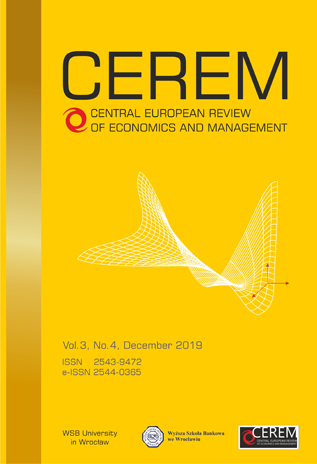Sustainability of the Bulgarian food processing industry
DOI:
https://doi.org/10.29015/cerem.745Abstract
Abstract:
Bulgarian agricultural sector underwent a transformation during the last decade of the 20th century, and its economic impact has lessened as a result. After the accession of the country to the European Union in 2007 Bulgarian agricultural product had uninterrupted access to the common market and most producers has oriented their production towards it. As a result Bulgarian food processing industry was put under great stress, due to its supply chain being greatly compromised.
Aim: To investigate the sustainability of the functioning and development of the food processing industry in Bulgaria.
In order to achieve this goal, the following tasks are solved:
- to analyze the state and development of Bulgaria food industry;
- to examine the problems and prospects for its sustainable functioning.
Design / Research methods: The methods used to solve the tasks are: analysis and synthesis, systematic and structural approach, statistical calculations.
Conclusions / findings: The expectations of the study are that both positive and negative trends in the sustainable functioning of the food processing industry in Bulgaria will be identified.
Originality / value of the article: The prospects for the sustainable development of the food processing industry are in direct correlation and dependence not just on the opportunities for development of foreign markets as a result of the liberalization and globalization of trade, but also on the preservation of its positions in our national market.
Downloads
Published
Issue
Section
License
The aim of CEREM is to make scientific work available in accordance with the principle of open access. The rules mentioned below are important, as they enable CEREM and its publisher, the WSB Merito University in Wroclaw, to distribute the scientific work to a wide public while complying with specific legal requirements, at the same time protecting the rights of the authors.
The author transfers to the WSB Merito University in Wroclaw, free of charge and without territorial limitations, with all proprietary copyrights to the said piece of work in the understanding of the act of 4th February 1994 on copyrights and derivative rights (Journal of Laws of 1994, no. 24, item 83, as amended) on an exclusivity basis, i.e. the rights to:
1. Make the piece of work in question available via the Digital Library established by the WSB Merito University in Wroclaw.
2. Produce, record and reproduce in multiple copies the piece of work using any techniques whatsoever, including printing, reprography, magnetic recording and digital processing, and particularly its reproduction by recording on CDs and similar data carriers,
3. Use fragments of the piece of work for promotional purposes in publications, promotional materials, the Internet and Intranet type networks managed by the WSB Merito University in Wroclaw.
4. Store the piece of work into computer databases managed by the WSB Merito University in Wroclaw.
5. Copy and reproduce the piece of work using photo-mechanic technologies other than those commonly known at the time of the signature hereof (photocopies, Xerox copies etc.),
6. Process the piece of work, transferring it into an electronic form, and distribute it on the Internet without limitations.


